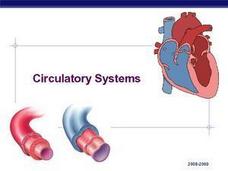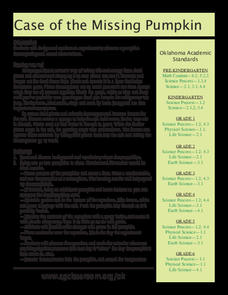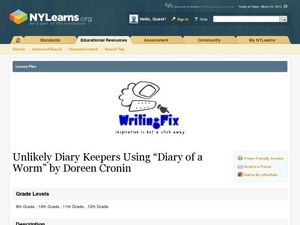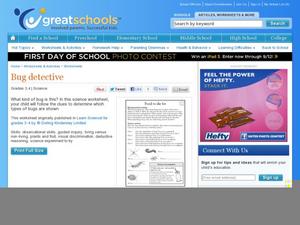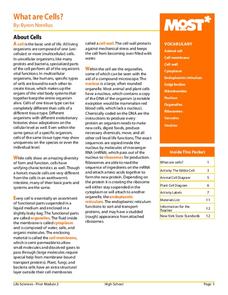Captain Planet Foundation
Shape Shifters in the Math Garden
Combines mathematical measurement with gardening skills. Third graders hunt for worms in the garden and try to find the longest one. They also measure and weigh vegetables that they harvest from the garden, measure rainfall amounts, and...
Curated OER
Circulatory Systems
Excellent diagrams, labels and summaries make this resource be valuable to your students throughout the topic of circulation. All types of circulation vessels are explained, their structure and function is detailed, and the overall...
Curated OER
Circulatory Systems
A slideshow that covers the all-important details related to basic human circulation. The reasoning for exchange of material methods is presented and then labeled diagrams of the main human transfer systems are shown, along with...
MOST
What Are Cells?
What's in a cell, anyway? Kids read informational text on what makes up both animal and plant cells, including a page of vocabulary terms they will need to be familiar with (cytoplasm, ribosomes, vacuoles, etc.). Full-color images make...
North Clackamas Schools
Sorting Living and Nonliving Objects
Is a rock living? How about lima beans? You'll find everything you need for an interactive sorting activity exploring living and non-living things.
Growing Classroom
Space Travelers
Groups of three scientists from the rocky planet Zog investigate the composition of soil so that they can take the information back to their home, create soil there, and begin to grow food.
Curated OER
Introduce Vocabulary: Grandfather's Journey (Say)
Read Allen Say's classic tale Grandfather's Journey as scholars expand their vocabulary in context (note: this strategy could be done with any text). Wondering what words they will learn here? Although you could easily include more,...
National Wildlife Federation
Habitat Web
Young scientists weave together an understanding of ecosystems with this fun collaborative activity. Taking on the roles of different living and non-living elements of specific habitats, learners use a ball of yarn to create the web of...
Curated OER
Recyclers to the Rescue
Producers, consumers, food chains, and plants are the stars of this science instructional activity. Learners take part in an inquiry which helps them to discover the most effective and efficient way to grow a producer. They have a...
Desert Museum
Daisy Ecology
Here's a fine lesson plan that combines poetry with life sciences. Learners carefully listen to a poem that's all about a food chain. As the poem is read, learners name the producer, the herbivore, the carnivore, and the omnivore. Lots...
Curated OER
Case of the Missing Pumpkin
Scientists define and discuss decomposition, and watch pumpkins decompose and return to soil in classroom experiment. They record the date the experiment began, chart changes in pumpkins on a calendar, count how many days it takes...
Curated OER
Living-Nonliving
Students determine that environments have living and nonliving parts. They discuss what makes something a living thing and something a nonliving thing. They make a chart and list characteristics of living things and nonliving things.
Curated OER
Which One is an Insect?
In this science worksheet, learners categorize 18 words as either insects or not insects. Students write the words in a two-column chart under the correct category.
Curated OER
Meiosis Worksheet
These two pages cover the gamut of topics regarding reproduction and DNA replication. Structures, processes, functions, and reasons for them are tested here. The questions are mostly multiple choice, but there are also a few...
Curated OER
Unlikely Diary keepers Using Diary of a Worm by Doreen Cronin
Put your class in the shoes of someone - or something - else with this lesson, which encourages writers to keep a diary from the perspective of a living creature or an abstraction. Use Doreen Cronin's Diary of a Worm and the Six Trait...
Curated OER
Nature's Perfect Recycler
What a great way to start a recycling lesson! Introduce your students to the dung beetle! They will get a kick out of "nature's perfect recycler," when they learn about the scarab beetle's way of life: eating dung and rotting...
National Park Service
Reduce Our Carbon Footprint, Let’s Compost!
Roll up your sleeves and get a little dirty with this elementary and middle school compost lesson. All you need is a large plastic container, a couple old newspapers, some organic waste, and a few hundred worms and you're ready to start...
Curated OER
Bug Detective
What happens when a living thing dies? After reading a paragraph of background knowledge on the life cycle of bugs, third and fourth graders work through four clues to figure out which bug is which. When they finish, they can study the...
Curated OER
Investigating What Makes Fruit Go Brown
Is there anything that can be done to slow the browning of fruit once it has been cut? High schoolers determine the answer through five different investigations involving apples, potatoes, and chemical reactions. After each experiment,...
Curated OER
Complete Novel Guide: James and the Giant Peach
Before your class reads the book James and the Giant Peach, check out this very handy set of learning activities. The reading guide provides you with several excellent ideas for building vocabulary related to the text and reading...
University of Kentucky
The Great Spider Debate
Poor, misunderstood spiders! They are feared, disrespected, and detested by many people, yet they do so many positive things. A great addition to any insect unit, learn about some of the more common spiders, while hopefully dispelling...
Exploring Nature Educational Resources
Building A Classroom Food Web
From bears and owls to chipmunks and trees, all life depends on the sun for the energy to survive. Young biologists develop an understanding of this big idea as they arrange this series of plant and animal picture cards into food webs...
Curated OER
What Are Cells?
Energize the cells of young biologists with an edible life science activity. Engaging students in exploring the inner workings of plant and animal cells, this activity involves using colored jello and various sweet and tasty treats to...
New South Wales Department of Education
Invertebrates
Of all invertebrates, insects by far are the most numerous. Scholars discuss invertebrates and then use a key to classify them. They see different examples and must describe features of each organism based upon the key.
Other popular searches
- Earthworm Dissection
- Earthworm Anatomy
- Earthworm Activities
- Earthworm Answers
- Earthworm Parts
- Earthworm Habitat
- Earthworm Life Cycle
- Nitrogen Cycle Earthworms
- All About Earthworms
- Earthworm Heart Rate
- Earthworms and Soil
- Earthworms Experiment




